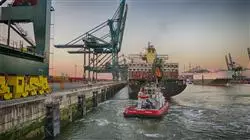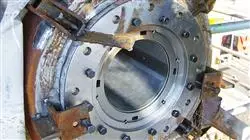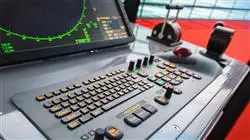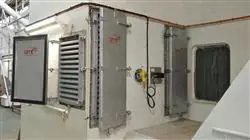University certificate
The world's largest faculty of engineering”
Introduction to the Program
En TECH queremos ofrecerte la mejor capacitación sobre Research, Development and Innovation in Naval Engineering para que te especialices en este sector y aumentes tus posibilidades de contratación”

El Postgraduate certificate en Research, Development and Innovation in Naval Engineering es un programa de altísimo nivel académico que pretende capacitar a los profesionales en este sector, habilitándolos para desarrollar su labor con las máximas exigencias de calidad y seguridad. Se trata de una completísima actualización, realizada por profesionales con años de experiencia, en la que se han añadido los últimos avances en la materia.
En este programa se pondrá el foco en las actuales vertientes y tendencias de innovación y desarrollo que están emergiendo en cada área del ciclo de vida de un proyecto naval. Así, el programa comenzará por el estudio de la innovación en ingeniería en materiales y el uso de las nuevas metodologías de diseño, para conseguir un diseño confiable.
También se profundizará en el gemelo digital desde el enfoque de todo el ciclo de vida del proyecto, y se explicará el diseño y tendencias de los buques autónomos. Los temas centrales del programa profundizarán en la innovación energética desde el área de combustibles alternativos, la eficiencia energética y las energías renovables.
Conocer los distintos medios de generación de energías limpias en el entorno marino o los proyectos actuales y tendencias de aerogeneradores marinos (fijos y flotantes), y la generación de energía por el uso de las mareas es otro de los puntos fuertes de esta especialización, en la que también habrá cabida para conocer las últimas tendencias en sistemas de comunicación y la aplicación de la tecnología Blockchain en la gestión de las flotas.
Cabe destacar que al tratarse de un programa 100% online, el alumno no estará condicionado por horarios fijos ni necesidad de trasladarse a otro lugar físico, sino que podrá acceder a los contenidos en cualquier momento del día, equilibrando su vida laboral o personal con la académica.
La realización de este programa colocará a los profesionales de la ingeniería naval a la vanguardia de las últimas novedades en el sector”
Este Postgraduate certificate en Research, Development and Innovation in Naval Engineering contiene el programa educativo más completo y actualizado del mercado. Las características más destacadas del programa son:
- El desarrollo de casos prácticos presentados por expertos en Ingeniería Naval
- Los contenidos gráficos, esquemáticos y eminentemente prácticos con los que están concebidos, recogen una información científica y práctica sobre aquellas disciplinas indispensables para el ejercicio profesional
- Los ejercicios prácticos donde realizar el proceso de autoevaluación para mejorar el aprendizaje
- Su especial hincapié en metodologías innovadoras en producción
- Las lecciones teóricas, preguntas al experto, foros de discusión de temas controvertidos y trabajos de reflexión individual
- La disponibilidad de acceso a los contenidos desde cualquier dispositivo fijo o portátil con conexión a internet
Este programa es la mejor inversión que puedes hacer en la selección de un programa de actualización en Research, Development and Innovation in Naval Engineering. Te ofrecemos calidad y libre acceso a los contenidos”
Incluye en su cuadro docente a profesionales pertenecientes al ámbito de la ingeniería naval, que vierten en esta capacitación la experiencia de su trabajo, además de reconocidos especialistas de sociedades de referencia y universidades de prestigio.
Su contenido multimedia, elaborado con la última tecnología educativa, permitirá al profesional un aprendizaje situado y contextual, es decir, un entorno simulado que proporcionará un aprendizaje inmersivo programado para entrenarse ante situaciones reales.
El diseño de este programa se centra en el Aprendizaje Basado en Problemas, mediante el cual el profesional deberá tratar de resolver las distintas situaciones de práctica profesional que se le planteen a lo largo del curso académico. Para ello, el profesional contará con la ayuda de un novedoso sistema de vídeo interactivo realizado por reconocidos expertos en Research, Development and Innovation in Naval Engineering y con gran experiencia.
Esta capacitación cuenta con el mejor material didáctico, lo que te permitirá un estudio contextual que te facilitará el aprendizaje"

Este Postgraduate certificate100% online te permitirá compaginar tus estudios con tu labor profesional. Tú eliges dónde y cuándo capacitarte"
Syllabus
The contents have been structured and designed by the best professionals in Naval and Ocean Engineering, who have extensive experience and recognized prestige in the profession, and who are aware of the benefits that the latest educational technology can bring to higher education.

We have the most complete and up-to-date program on the market. We strive for excellence and for you to achieve it too"
Module 1. Research, Development and Innovation in Naval Engineering
1.1. New Design Methodologies: Reliability
1.1.1. Risk Analysis
1.1.2. FMEA
1.1.3. HAZID
1.1.4. HAZOP
1.2. Engineering: R&D&I: New Materials
1.2.1. New Materials
1.3. R&D&I: Digital Twin Technology
1.3.1. Product
1.3.2. Production
1.3.3. Performance
1.4. R&D&I: Autonomous Vessels
1.4.1. Autonomous Vessels
1.4.2. Regulations
1.4.3. Difference from Intelligent Vessels
1.4.4. Classification Societies
1.4.5. Examples of Autonomous Vessel Projects
1.5. R&D&I in Energy (I): Alternative Fuels
1.5.1. Liquefied Natural Gas (LNG): The Clean Alternative to Multi-Disciplinary Design Optimization (MDO)
1.5.2. Hydrogen as a Future Naval Fuel
1.5.3. Fuel Cell
1.6. R&D&I in Energy (II): Energy Efficiency
1.6.1. Clean Concepts for Vessels
1.6.2. EEDI: Efficient Vessels
1.6.3. EEOI
1.6.4. SEEMP
1.7. R&D&I in Energy (III): Renewable Energies
1.7.1. Floating Wind Turbines
1.7.2. Wave Energy
1.7.3. Tidal
1.8. Innovation and New Technologies in Construction
1.8.1. Augmented Reality and 3D Vision, Virtual Reality
1.8.2. Productive Improvements Based on Information Management
1.9. Innovation in Operation (I): New Communication Systems
1.9.1. Satellite Systems
1.9.2. Impulse Systems (Sonar, Radars)
1.10. Innovation in Operation (II): Applying Blockchain Technology in Fleet Management
1.10.1. Definition of Blockchain
1.10.2. Application Examples

A comprehensive and multidisciplinary educational program that will allow you to excel in your career, following the latest advances in the field of Naval Engineering"
Postgraduate Certificate in Research, Development and Innovation in Naval Engineering
.
The Postgraduate Certificate in Research, Development and Innovation in Naval Engineering is an academic program of vital importance in the field of naval and maritime engineering. This specialized training provides professionals in the sector with the necessary tools to keep abreast of the technological and scientific advances occurring in this discipline. Naval engineering is a branch of engineering dedicated to the design, construction and maintenance of vessels and maritime structures. In an increasingly interconnected and globalized world, it is essential to have highly trained professionals who can meet the challenges posed by the naval sector. The Postgraduate Certificate in Research, Development and Innovation in Naval Engineering provides the opportunity to acquire the necessary knowledge to develop research and development projects in this area. In addition, it allows participants to become familiar with the latest technologies and methodologies applied in the design and construction of modern ships and maritime structures.
Study online with TECH
.
At TECH you will have the opportunity to study from the comfort of your home, since the methodology is 100% online, with the best teachers in the industry. You will be able to access the academic material 24 hours a day and enjoy specialized readings, summaries of the classes and a quality syllabus to complement the online classes. The Postgraduate Certificate in Research, Development and Innovation in Naval Engineering is a unique opportunity for professionals in this sector. With this academic program, they will be able to update themselves in the latest technological advances, develop research projects and acquire the necessary skills for innovation in the maritime field. Naval engineering is a constantly evolving sector and having specialized training is essential to face the challenges it poses.







